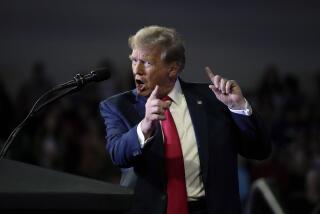Gorbachev Bid on Nicaragua Confirmed
- Share via
WASHINGTON — President Reagan confirmed Tuesday that Soviet leader Mikhail S. Gorbachev, to promote Central America peace prospects, has suggested suspending Kremlin military assistance to Nicaragua.
In his first public comment on a conversation with Gorbachev while they walked together on the White House grounds last week, Reagan said, “All I know is that Gorbachev told me he wanted to go forward with the peace plan and he would withhold aid from the Sandinistas.”
Asked whether the Soviet leader had, in fact, pledged to hold back support from the Marxist regime, the President replied, “All military aid.” But Reagan said Gorbachev “did specify that there might be some small arms, police-type weapons.”
On Capitol Hill, House and Senate negotiators worked to find a compromise on further aid to Nicaragua’s Contras. The Senate has approved $9 million in non-lethal aid along with an unlimited account to pay for transportation of the aid by the CIA. The House bill contains no aid.
“Our interests remain the same--to buttress the peace process,” said Rep. David R. Obey (D-Wis.), one of the negotiators. The House will not accept any provision such as the one in the Senate bill that permits delivery of military aid along with new humanitarian supplies, he said.
The President acknowledged Gorbachev’s offer during a picture-taking session with Republican congressional leaders invited to discuss ratification prospects for the treaty banning the superpowers’ ground-launched, intermediate-range missiles.
Reporters had only a brief opportunity to question Reagan during the short interlude in the Cabinet Room.
But White House spokesman Marlin Fitzwater, questioned at length later, refused to say whether Gorbachev had sought to link possible suspension of Soviet aid to cessation of U.S. military support for the Contras fighting President Daniel Ortega’s leftist government.
‘Can’t Offer Language’
“I can’t offer language,” Fitzwater said. “I can’t offer language for Gorbachev other than what the President said.”
Asked why Reagan did not immediately pursue the matter with Gorbachev, the spokesman replied: “The issue had been discussed a little bit before that (midday White House driveway stroll). But this (Gorbachev’s) statement apparently was made as they were walking to lunch. I don’t know the circumstances of that moment, but it seems to me there were a lot of human factors as to why it wasn’t followed up.”
Asked to elaborate, Fitzwater said only that “the luncheon focused primarily on arms control and verification.”
Gorbachev’s remark came on the last day of his three-day summit with Reagan, and Fitzwater repeated the White House assertion that Administration officials are “following up through diplomatic channels.”
At an appearance on Capitol Hill on Tuesday, Assistant Secretary of State Elliott Abrams said the diplomatic contacts will be made this week.
Fitzwater, discussing the context of that suggestion, said the Soviet leader was referring to the Central American peace plan developed by Costa Rican President Oscar Arias Sanchez and was demonstrating interest in seeing whether it could succeed.
The Arias plan requires an end to U.S. aid to the Contras. This is in contrast to the rival plan that Reagan proposed last summer along with House Speaker Jim Wright (D-Tex.).
The Reagan-Wright plan, which has been largely overtaken by the Arias plan, would go much further in requiring a halt to Soviet military aid to Nicaragua.
During the White House photo session, Reagan told reporters: “I think this is a subject that we are going to be discussing for quite some time. All I know is that he (Gorbachev) told me he wanted to go forward with the peace plan and that they would withhold aid from the Sandinista government in order to do so.”
More to Read
Sign up for Essential California
The most important California stories and recommendations in your inbox every morning.
You may occasionally receive promotional content from the Los Angeles Times.













